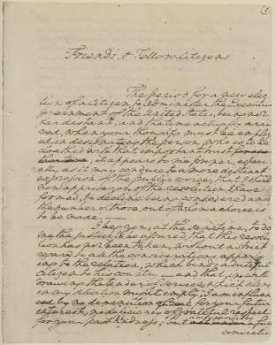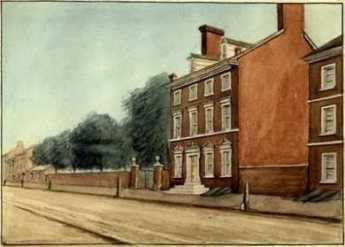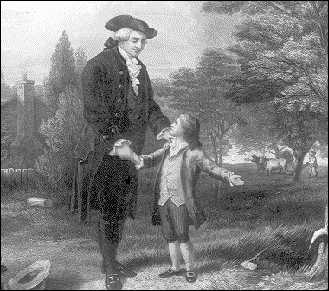Related Topics
Shaping the Constitution in Philadelphia
After Independence, the weakness of the Federal government dismayed a band of ardent patriots, so under Washington's leadership a stronger Constitution was written. Almost immediately, comrades discovered they had wanted the same thing for different reasons, so during the formative period they struggled to reshape future directions . Moving the Capitol from Philadelphia to the Potomac proved curiously central to all this.
Right Angle Club 2009
The 2009 proceedings of the Right Angle Club of Philadelphia, beginning with the farewell address of the outgoing president, John W. Nixon, and sadly concluding with memorials to two departed members, Fred Etherington and Harry Bishop.
George Washington in Philadelphia
Philadelphia remains slightly miffed that Washington was so enthusiastic about moving the nation's capital next to his home on the Potomac. The fact remains that the era of Washington's eminence was Philadelphia's era; for thirty years Washington and Philadelphia dominated affairs.
George Washington's Cherry Tree, Revisited
|
||
| George Washington Chopping the Cherry Tree |
Parson Weems, it seems, was a mercenary type who made up stories because he thought they would sell. Someone should explore the history of this anti-Weems debunking campaign for us, because it has distracted history from what may be a far more important truth about the founding, and the founder, of our country.
The address President Washington sent to his countrymen, published September 19, 1796, will apparently be forever referred to as his Farewell Address, and it is true that one of the important points he was making was the President should have only two terms of office, adding in his particular case the determination not to die while in office and create undesirable precedents for Presidential succession. It is also sometimes stressed that Washington cautioned the nation against all foreign entanglements, although likely he had in mind the particular conflicted loyalty at the time between England which we strongly resembled, and France to whom we owed a debt of gratitude for our independence. Surely he was telling the nation to watch out for its precarious independence, even at the price of disappointing old friends, and not really attempting to look centuries ahead in foreign relations. The point about a third term was a pretty firm one; Washington's greatest achievement in the eyes of the world was to renounce all resemblance to monarchy, which he could have had for the asking.

|
| Farewell Address for George Washington |
Much deeper meaning for the address is suggested when you search, let's say with Google, for the origins of the speech's repeated maxim, Honesty is the best policy. It sounds like the sort of thing Ben Franklin would put in his Almanac, but didn't. There are even times in Franklin's life when it might be questioned whether he really believed honesty was always the best choice for every situation, and Franklin's true belief might possibly have been closer to advising that you should strive to avoid getting caught misleading people. The opinion that honesty is the best policy sounds as if it might come from Shakespeare, or Cervante's Don Quixote; something pretty close can be found in both places. It might be much older than that; the phrase and a detailed examination of its merits can be found in the works of Quintilian, 69 AD. George Washington was unlikely to have read any classical Roman essays, but James Madison the favorite student of John Witherspoon at Princeton might well have been familiar with Quintilian. But these stray remarks about honesty are merely scatterings over fifteen centuries, mostly throw-away lines. It is only in the last decades of the Eighteenth Century that the little maxim is found peppered in the speeches of many people, beginning to use it as a cliche to adorn some other point of emphasis.
 It is our true policy to steer clear of permanent alliances with any portion of the foreign world; so far, I mean, as we are now at liberty to do it; for let me not be understood as capable of patronizing infidelity to existing engagements. I hold the maxim no less applicable to public than to private affairs, that honesty is always the best policy. I repeat it, therefore, let those engagements be observed in their genuine sense. But, in my opinion, it is unnecessary and would be unwise to extend them. 
|
The point begins to catch the imagination that perhaps this flowering of a maxim can be traced to Washington's Farewell Address. It's unlikely that George Washington actually coined the phrase that honesty was the best policy, any more than Franklin Roosevelt coined the motto that all we have to fear is fear itself, or John Kennedy originated the happy phrase that we should ask not what our country can do for us, etc. Our more sophisticated views of Presidential rhetoric are now quite broad enough to accept the existence of ghostwriters and wordsmiths. It is current practice to agree that credit for originating a phrase adheres rightly to the person symbolized later when the phrase enters common parlance. To think otherwise is to become entangled in bickering about who wrote Shakespeare's plays, or who really wrote the various books of the Bible.

|
| President's House Philadelphia |
There is, however, historical importance to the speech-writer question in Washington's case. We are told that Washington had asked James Madison to draw up a speech for the occasion of his declining to accept a second term of office in 1792, but the whole matter was reconsidered when various advisors finally persuaded the President that the country needed him at the helm for more than four years. The speech was therefore set aside but revised and re-issued four years later. By this time, however, Washington and Madison had experienced their fateful falling-out, and therefore Madison's arch-enemy Alexander Hamilton did the re-writing. That honesty is the best policy should survive as a centerpiece in an address co-edited by such bitter philosophical enemies, plus some passing reflection on the personalities of the three men, should suffice to dispel most doubt that the sentiment was Washington's and that it must have been held very intensely by him. Madison may well have planted it, and he might very well have got it in turn from Cervantes or Quintilian. David Hume of Scotland might be an even likelier source. But overall it is hard to let go of the idea that Washington seized on it as a summary of something he fiercely believed.
There are differing degrees of and situations for honesty, of course; surely the most trivial is the sort of honesty Parson Weems was imagining in the little lad who would become our greatest leader. It really is not necessary to believe the courage to risk a whipping by a schoolboy is a core value which evolves into the broad economic vision for a nation. The legal profession, for example, may even overvalue absolute precision of wording, sometimes tolerating exquisite accuracy which artfully avoids full disclosure, caveat emptor. The military academies come closer to Washington's meaning by stressing to their graduates that what matters is not what is said, but what is communicated. At the time of the Farewell letter, what agitated Washington most was political partisanship -- political parties -- and overzealous effort to defeat the opinions of honest opponents rather than strive for a resolution of problems by bargain and compromise. In his youth, Washington was a surveyor, deeply impressed by the advantages of getting things straight the first time. Washington was to lose the argument over political parties, but while this defeat was among his greatest disappointments, his resistance still shines like a beacon.
It is hard to discern whether Washington had the depth of economic insight to emphasize the feature of honesty is the best policy which has the greatest importance to the Twenty-first Century. However, it is possible he did, because he was speaking in the midst of Quaker Philadelphia, having centered most of his public life there. Puritan Boston deeply believed that God had commanded honesty in His followers, honesty for its own sake, and the sake of the honest person's soul. But the wealth of Boston was overshadowed by thriving Eighteenth-century Quaker Philadelphia. Honesty to a Quaker was, of course, a good thing in itself, but experience showed that strict honesty in commercial dealings, and friendliness in all dealings, was very good for business. And conversely, the example of success on all sides encourages others to be honest and friendly when perhaps it was not their first inclination; honesty is catching. John Adams was scornful of those who do the right thing for the wrong reason, but this viewpoint gets ignored in the Twenty-first century. What is important for the third world to grasp is not intuitively obvious; they see abundant examples of getting rich at the expense of others, so much so that the third world and much of our own is willing to believe that if you have prospered, you must have stolen. If the third world cannot grasp the higher truth, we despair of ever getting along with them. Indeed, we may need to worry about skeptics increasing in our own midst. If Washington ever wavered, however, no one has told us of it.
Originally published: Tuesday, November 03, 2009; most-recently modified: Monday, May 20, 2019
| Posted by: cheapostay | Feb 13, 2012 9:41 AM |
| Posted by: esalerugs | Feb 13, 2012 9:19 AM |
| Posted by: gretjobrandy | Dec 31, 2010 4:32 AM |
